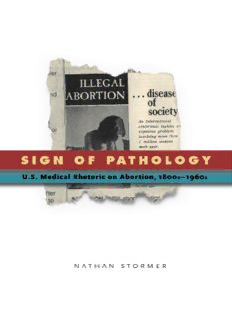
Sign of Pathology: U.S. Medical Rhetoric on Abortion, 1800s–1960s PDF
Preview Sign of Pathology: U.S. Medical Rhetoric on Abortion, 1800s–1960s
Sign of Pathology RSA STR The RSA SerieS in Tr anSdiSciplinary RhetoRic Edited by Michael Bernard- Donals (University of Wisconsin) and Leah Ceccarelli (University of Washington) Editorial Board: Diane Davis, The University of Texas at Austin Cara Finnegan, University of Illinois at Urbana- Champaign Debra Hawhee, The Pennsylvania State University John Lynch, University of Cincinnati Steven Mailloux, Loyola Marymount University Kendall Phillips, Syracuse University Thomas Rickert, Purdue University The RSA Series in Transdisciplinary Rhetoric is a collaboration with the Rhetoric Society of America to publish innovative and rigor- ously argued scholarship on the tremendous dis ciplinary breadth of rhetoric. Books in the series take a variety of approaches, includ- ing theoretical, historical, interpretive, critical, or ethnographic, and will examine rhetorical action in a way that appeals, first, to scholars in communication studies and English or writing, and, second, to at least one other discipline or subject area. Nathan Stormer Sign of Pathology U.S. Medical Rhetoric on abortion, 1800s–1960s The Pennsylvania sTaTe UniversiTy Press UniversiTy Park, Pennsylvania Library of Congress Cataloging- in- Publication Data Stormer, Nathan, 1966– , author. Sign of pathology : U.S. medical rhetoric on abortion, 1800s–1960s / Nathan Stormer. pages cm — (The RSA series in transdisciplinary rhetoric) Summary: “Examines the medical discourse on abortion in the United States from the 1800s to the 1960s. Demonstrates that abortion was seen as a sign of social pathology indicating undoing of civilization”—Provided by publisher. Includes bibliographical references and index. ISBN 978-0-271-06555-7 (cloth : alk. paper) 1. Abortion—United States—History. 2. Rhetoric. I. Title. HQ767.5.U5S769 2015 362.1988'80973—dc23 2014034004 Copyright © 2015 The Rhetoric Society of America All rights reserved Printed in the United States of America Published by The Pennsylvania State University Press, University Park, PA 16802-1 003 The Pennsylvania State University Press is a member of the Association of American University Presses. It is the policy of The Pennsylvania State University Press to use acid- free paper. Publications on uncoated stock satisfy the minimum requirements of American National Standard for Information Sciences—Permanence of Paper for Printed Library Material, ANSI Z39.48–1992. This book is printed on paper that contains 30% post-consumer waste To BUeller and Mclovin, my cats, one or the other of which has watched me write almost every word of this manuscript (with closed but attentive eyes). Here is another book to sleep on, made especially for you. Contents Acknowledgments | ix Introduction: Struggling Through Life | 1 ParT 1 1 When Abortion Became a Political-E conomic Problem | 27 2 Remembering, Forgetting, and the Secrets of Life | 49 ParT 2 3 “White Man’s Plague”: Anti-M althusian Memory Work at the Fin de Siècle | 69 4 “More Wisdom in Living”: Neo- Malthusian Memory Work at Midcentury | 101 5 “The Lesser of Threatened Evils”: Therapeutic Amnesias | 134 Conclusion: Seeking Immunity | 169 Notes | 185 Bibliography | 219 Index | 245 acknowledgments I have been working on this book for so long that it feels like its unfinishedness is what I am, a book in waiting. I thought I would knock it out in five years after my first book, tops. It took thirteen. Working as the sole author, particularly on a long, complicated research project, can be very isolating. I began to lose hope of ever finishing it and I reconsidered what I was doing, but finally I found my footing again. I never stopped working on it, yet looking at it now it seems to have taken rather a long time for an ordinary-s ized book. You’d expect more of a doorstop from that much effort. I don’t mean to be maudlin about a completed book that I am proud of; there was no wailing or gnashing of teeth (well, a bit), and my slowness is of little meaning to anyone but my partner, Naomi, and me. What I want to say is that if it were not for many people who were kind to me, I might have given up and I am so happy to have this space to acknowledge that help and support. Whatever is good in this work is a reflection of the friends and colleagues whom I am so fortunate to have. I am grateful to the many librarians and archivists who have helped me over the years at the Allegheny Special Collection on Women and Medicine, the American Medical Association Medical Fraud Archive, the Biddle Law Library, the Francis A. Countway Library of Medicine, the Frederick J. Taussig Papers at Washington University, the National Library of Medicine, the Schlesinger Library, the Sophia Smith Collection, the Wangensteen Historical Library, and the Western Historical Manuscript Collection. I am also grateful to Taylor and Francis for allowing me to reprint some portions of several of my essays within chapters of this manuscript (“A Likely Past: Abortion, Social Data, and a Collective Memory of Secrets in 1950s America,” Communication and Critical/ Cultural Studies 7 [2010]: 337–59; “Mediating Biopower and the Case of Prena- tal Space,” Critical Studies in Media Communication 27 [2010]: 8–23; “Recursiv- ity: A Working Paper on Rhetoric and Mnesis.” Quarterly Journal of Speech 99 [2013]: 27–50). I am very thankful for my colleagues Michael Socolow, Liam Riordan, and Constanza Ocampo-R eader, who read several chapters from this manuscript and helped me focus on audience so much better than I could have otherwise.
Description: